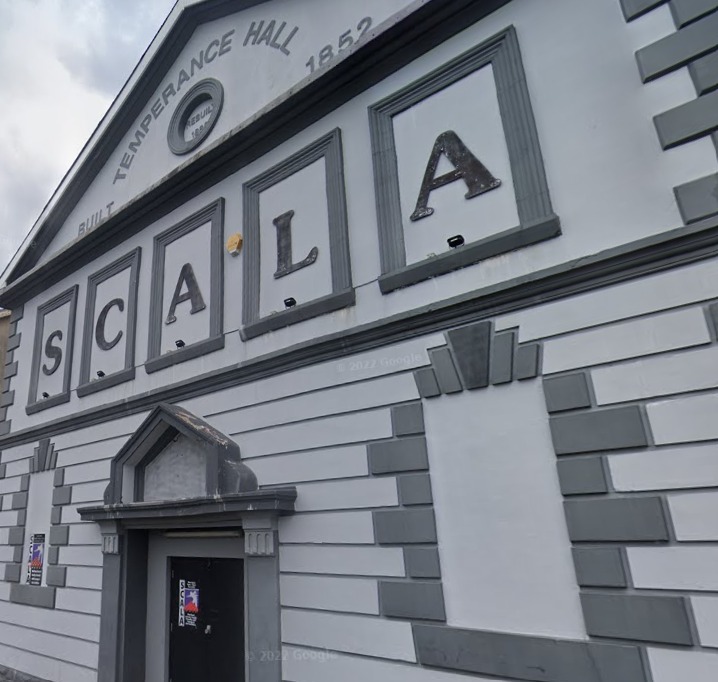A MERTHYR TYDFIL music venue will have to stop playing live music at 8pm following complaints from a neighbour that their son could no longer stay in their property as a result of noise and from a snooker venue saying that the vibrations were causing balls to move on the tables.
A review of the premises licence of The Scala in John Street by the council’s licensing committee on Thursday, February 11, saw concerns raised by a local resident and a business owner around noise levels at the venue and conditions added to the licence which included stopping live music at 8pm, an independent noise impact assessment, and works to ensure the future acoustic integrity of the building.
An impact statement from the resident went to the committee and described how his son was no longer able to stay with him due to the noise levels in his property and the business owner described how the vibration of the music caused snooker balls to move on tables in its premises.
As a result noise monitoring was done by the council’s environmental health department which showed statutory noise nuisance.
Following an independent review undertaken by The Scala the owner wrote to a council public health officer saying that despite their efforts it has become evident that no specific decibel level can fully address the noise impact on the flat due to significant structural vibrations.
The owner added the findings suggest that operating as a music venue under the current conditions is unsustainable and without substantial structural modifications the building does not serve its intended purpose as a music venue.
After considering the information provided by all parties involved the committee members agreed the review process was conducted appropriately and that a measured approach had been followed by the environmental health department.
They also acknowledged that a public nuisance had occurred at the premises, which violated the licensing objective of preventing public disturbances.
Committee members also considered the steps put forward by the premises licence holder to address noise nuisance and their long-term redevelopment plans.
The committee therefore felt that it was appropriate to place additional conditions on the licence to control how live music can continue at the venue.
These include stopping live music at 8pm and for the business to undertake an independent noise impact assessment and implement the recommended measures within a specified time.
The decision notice said that it was noted in evidence and submissions from the premises licence-holder that they conceded that there had been “noise issues” at the premises.
But the decision notice also mentioned that the premises licence-holder felt the council had been premature in bringing the review and had treated the premises unfairly when the efforts they had taken to control the noise were taken into account.
The premises licence-holder stated they had been proactive and had engaged fully with both public health and the resident when dealing with concerns and complaints that had arisen and that a stepped approach had not been taken especially as the review was issued after the receipt of a sound and noise report dated February 6, 2024.
In response the public health department referred to a timeline which it said showed that the premises was made aware of noise issues from as early as August 23, 2023, and that noise nuisance had continued until seven months later.
Reference was also made that an abatement notice had been served on November 17, 2023, and that despite some noise mitigation work having been undertaken at this time the noise nuisance continued.
The committee took into account the representations from the premises licence-holder and from residents saying they’d never had issues with noise from the venue and the committee noted the support for the premises from a sizeable proportion of the local community who support a venue of this type.
The committee decided that conditioning the premises licence was both a necessary and proportionate means of ensuring that the licensing principle of prevention of public nuisance was promoted.
The decision notice said that the conditions allowed the premises to continue to operate while at the same time ensuring immediate neighbours have peace to enjoy their properties.
It was noted by committee that as matters currently stand, with regard to the acoustic properties of the premises, the premises cannot carry out live music events in the manner in which it has in the past.
The committee declined to set a decibel level for future live music and in deciding what conditions to apply to the licence it was noted that the premises had already taken the step of stopping live bands at 8pm which was considered to be an appropriate noise reduction measure.
Another condition relates to the measures that must be put in place to ensure the future acoustic integrity of the building and the committee was informed that works would be done in line with acoustic advice but the reason work had not been done was because of the uncertainties for the business as a consequence of the review.
The committee decided that six months would be sufficient time for the work to be completed and commented that it would be in the interests of everyone for this to be done immediately and the rest of the added conditions were conditions suggested by the premise licence-holder.
Responding to the decision Lyn Williams, the owner and premises licence-holder, said: “We believe the decision reached by the committee at the licensing hearing was pragmatic, taking into account the concerns of complainants, and offers our business a viable opportunity to sustain operations and jobs.
“It also grants us the flexibility to implement necessary adjustments to our infrastructure or business model. Notably many of the conditions imposed were already in practice and had been proactively suggested by our team.
“Prior to the authority’s attempt to revoke our license for live music we had independently implemented mitigation actions. At the hearing we confidently demonstrated the seriousness with which we addressed complaints and the concrete steps we took toward improvements.
“We contend that the decision to review our licence was unwarranted, highlighting a lack of cooperative effort from the authority to resolve these issues collaboratively.
“We are encouraged by the tremendous support from the community and remain optimistic about moving forward in a progressive and positive manner.”



















